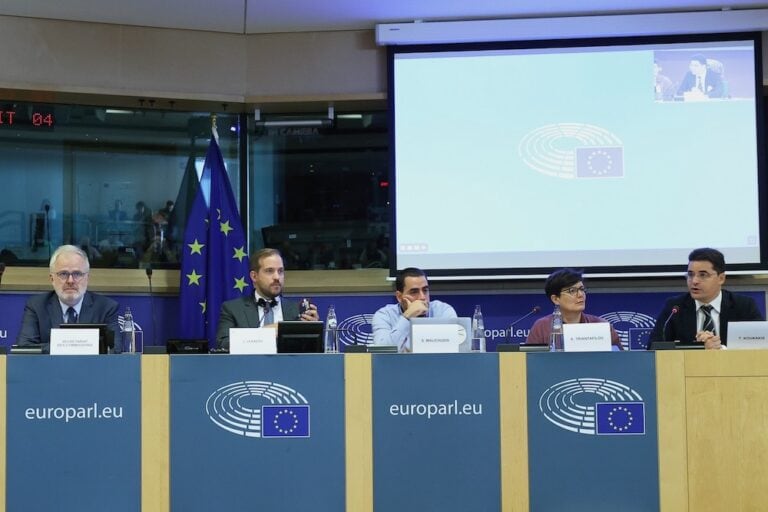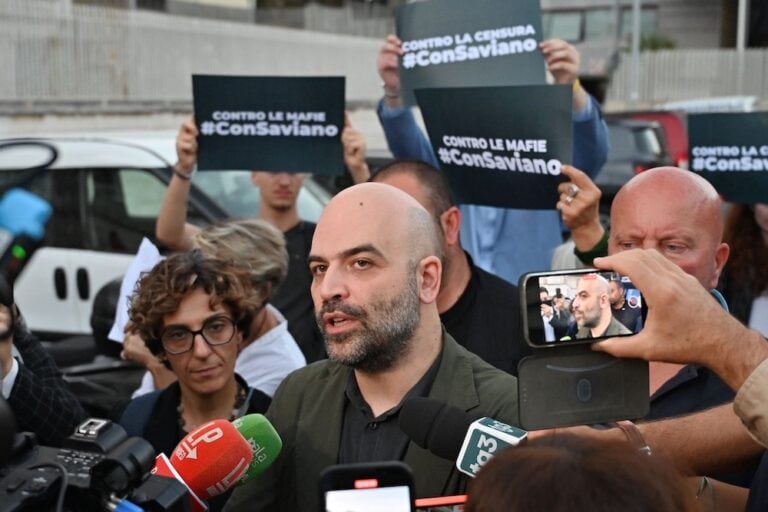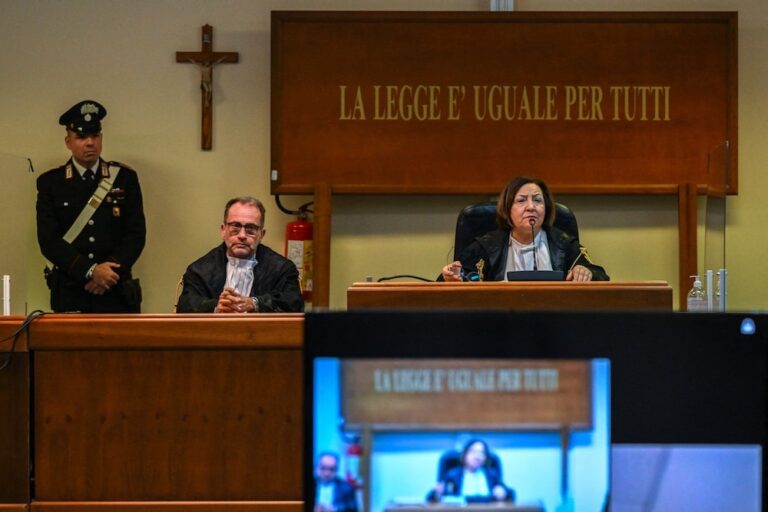CPJ is troubled by the manifest intolerance to criticism displayed by Perugia Public Prosecutor Giuliano Mignini, who has filed or threatened to file criminal lawsuits against individual reporters, writers, and press outlets, both in Italy and the United States.
(CPJ/IFEX) – In a letter to President Giorgio Napolitano, CPJ expressed concern about local authorities’ harassment of journalists and media outlets who criticise the official investigation into the November 2007 murder of British exchange student Meredith Kercher:
April 19, 2011
His Excellency Giorgio Napolitano
President of the Italian Republic
Palazzo del Quirinale
00187 Roma
Italia
Via email: presidenza.repubblica@quirinale.it
Dear President Napolitano,
The Committee to Protect Journalists, an independent, nonpartisan organization dedicated to defending the rights of journalists worldwide, is deeply concerned about local authorities’ harassment of journalists and media outlets who criticize the official investigation into the November 2007 brutal murder of British exchange student Meredith Kercher in the central Italian city of Perugia. CPJ is particularly troubled by the manifest intolerance to criticism displayed by Perugia Public Prosecutor Giuliano Mignini, who has filed or threatened to file criminal lawsuits against individual reporters, writers, and press outlets, both in Italy and the United States, in connection with the Kercher murder investigation as well as the investigation into the Monster of Florence serial killings.
The Kercher murder investigation was headed by Mignini and conducted by a Perugia police unit known as the Squadra Mobile. Mignini was also in charge of the latest investigation into the unsolved murders of eight couples in Tuscany between 1968 and 1985, collectively known as the Monster of Florence killings because of the especially cruel manner in which the victims were slain.
The anti-press actions of Squadra Mobile under Mignini’s supervision, coupled with Mignini’s longstanding record of harassment of journalists who criticize his conduct on the job, cause the press to stay away from sensitive subjects, including important developments in the Kercher case such as the appeal of two defendants in the case. CPJ is particularly concerned about the impact Perugia authorities’ repressive actions have on local reporters and individual bloggers, who lack the support and backing of major publications. These individuals are most vulnerable to official retaliation for their work, including legal prosecution and physical attack.
As the appeal of the defendants – U.S. student Amanda Knox and Italian student Raffaele Sollecito – continues at the appellate court of Perugia (Corte di Assise di Appello di Perugia), we call on you to ensure that journalists, writers, and bloggers are able to report and comment on the proceedings freely and without fear of reprisal.
Of the cases that have come to CPJ’s attention, one stands out because of the abusive actions employed by members of Squadra Mobile to punish a critic of the official Kercher murder inquiry. Local freelance reporter Frank Sfarzo created his English-language blog Perugia Shock in 2007, days after Kercher’s gruesome murder. Based in Perugia, Sfarzo became interested in the case from the start, posting reporting and comments on it on his blog. Sfarzo regularly criticized what he considered flaws in the Kercher investigation, at times using harsh language to express his views.
Sfarzo told CPJ his troubles started on October 28, 2008, the day Knox and Sollecito were indicted and a third defendant was convicted of murdering Kercher. Several members of Squadra Mobile, Sfarzo told CPJ, approached him just outside the city court (Corte di Assise di Perugia) and started to push and hit him. “You are pissing us off!” – they told him, referring to his coverage.
When the trial of Knox and Sollecito began that December, Squadra Mobile continued to harass him. They regularly tried to prevent him from entering the court; seized his cellphone and went through his contacts and text messages; mouthed insults at him from across the courtroom; and stared over his shoulder as he took notes. “This was done in the presence of the judge, the Carabinieri [the military police], and the court guards, but they would do nothing,” Sfarzo told CPJ.
The harassment reached its peak on September 28, 2010, when five officers of Squadra Mobile forcibly entered Sfarzo’s apartment. They did not produce a warrant or show their badges, Sfarzo told CPJ. Four of the five shoved Sfarzo to the ground, struck him, handcuffed him, and climbed on top of him, crushing his air supply, he told CPJ. They stopped when a neighbor, disturbed by the commotion, showed up, Sfarzo said.
Next, the officers took Sfarzo to the Perugia city hospital, where they claimed he had attacked them; they persuaded a doctor to issue a medical report for the injuries Sfarzo was alleged to have caused. In addition, the Squadra Mobile officers brought Sfarzo before a psychiatrist, demanding that she issue him a certificate of insanity. To prove that Sfarzo was mentally ill, the officers produced Sfarzo’s reporter’s notebook on the Kercher murder case, which they had seized from his apartment. “They told the doctor that I was pathologically obsessed with the case, that I was so fixated on it I must be insane,” Sfarzo told CPJ. The psychiatrist refused to issue the certificate.
From the hospital, the officers brought a handcuffed and injured Sfarzo to their headquarters, where, in the blogger’s words, they “displayed me as a trophy,” referring to him as “the bastard who defends Amanda [Knox].” The officers refused Sfarzo’s requests to call his lawyer or his relatives, and put him in a cell for the night.
The next day, the officers brought Sfarzo before a local judge, who validated his arrest and indicted him on several articles of Italy’s penal code for “using violence and threats to resist public officials” and “injuring an officer.” Sfarzo was released pending a trial in May. He faces up to six years in prison if convicted. “The police can count on the complicity of judges,” Sfarzo told CPJ. Police officers, he added, are sure of their impunity.
CPJ is also concerned that Prosecutor Mignini has filed or threatened to file criminal defamation lawsuits against a number of journalists and media outlets – both in Italy and in the United States – who have criticized his record.
( . . . )
Your Excellency, we are urging you to ensure that reporters and writers are not afraid to cover, comment on, and criticize the activities of Perugia authorities. This is particularly pressing now that the appeal of two defendants in the Kercher murder case goes on at a local court.
We ask you to ensure that the politically motivated lawsuit against Perugia blogger Frank Sfarzo is immediately scrapped and that outside investigators are assigned to conduct an investigation into the September 28-29, 2010, abusive actions of Squadra Mobile officers against him.
We also call on you, in your capacity as president of Italy’s Superior Judicial Council (Consiglio Superiore della Magistratura), to ensure that Perugia prosecutors, including Mignini, are not allowed to use criminal defamation as the proverbial bogeyman against their critics. It is unacceptable that journalists, bloggers, and writers on both sides of the Atlantic should censor themselves by staying away from subjects of public interest such as the Meredith Kercher murder case and the Monster of Florence killings because of Prosecutor Mignini’s inability to tolerate the scrutiny that comes with public office. It is also unthinkable that U.S. journalists – who have reported in Italy before and love the country – should not dare go back for fear of being arrested.
Thank you for your attention to this urgent matter. We await your response.
Joel Simon
Executive Director


